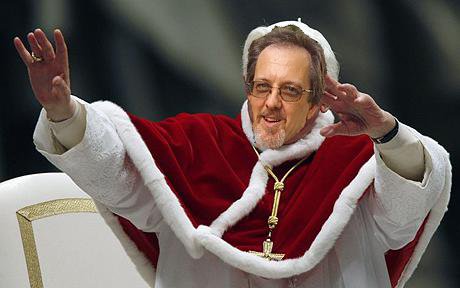+ Jesus =
Catholic theology, in contrast to Lutheran, holds that salvation by Jesus Christ involves a healing to whole, an intrinsic renewal towards completeness from the injury of Original Sin, our Fallen State.
Martin Luther (words in bold) was a preacher and a writer given over to strong hyperbole. No one, neither Catholic nor Protestant, debates this assertion, and so…

-by Dave Armstrong, raised as a Methodist in Detroit, Michigan, Armstrong converted to non-denominational, Arminian evangelicalism in 1977, with strong affinities to the Jesus Movement and Messianic Judaism, and then to Catholicism in 1990, largely as a result of reading Bl John Henry Cardinal Newman, CO,’s Essay on the Development of Christian Doctrine. He was received into the Catholic Church in February 1991 by Rev. John Hardon, SJ. Armstrong’s conversion story was one of eleven in Patrick Madrid’s Surprised by Truth.
“Conceived in sorrow and corruption, the child sins in his mother’s womb. As he grows older, the innate element of corruption develops. Man has said to sin: ‘Thou art my father’—and every act he performs is an offense against God; and to the worms: ‘You are my brothers’—and he crawls like them in mire and corruption. He is a bad tree and cannot produce good fruit; a dunghill, and can only exhale foul odors. He is so thoroughly corrupted that it is absolutely impossible for him to produce good actions. Sin is his nature; he cannot help committing it. Man may do his best to be good, still his every action is unavoidably bad; he commits a sin as often as he draws his breath.-Martin Luther, #8: “Werke (Wittenberg Edition), Vol. III, p. 518.” This refers to the edition of Luther’s works, published in Wittenberg: 12 volumes in German (1539-1559) and seven volumes in Latin (1545-1558).
-from Rev John Hardon, SJ, “St. Peter Canisius on Christmas Joy”, Homiletic and Pastoral Review, Vol. 48 – #3, December 1947, pp. 167-172)
“The Catholic Church teaches man is made in God’s image, and though he is fallen, he is not worthless excrement. This was one of the novel, peculiar contributions of the so-called “Reformation,” to introduce this non-biblical motif into Christian theology (sadly one of several such unbiblical themes). Luther himself picked up on this passage in his Lectures on Galatians, from 1535:
“And with Paul let us confess that all our works and righteousness . . . are nothing but loss and refuse (Phil. 3:8). And let us tread underfoot and utterly abhor, as a polluted garment (Is. 64:6) and the deadly poison of the devil, all the power of free will, all the wisdom and righteousness of the world, all religious orders, all Masses, ceremonies, vows, fasts, hair shirts, and the like.”-Luther Werks, vol. 26, p. 41; translated by Jaroslav Pelikan
“It is not enough that this sin is forgiven through grace, for through our infirmity we fall right back into sin . . . the thing itself, which is truly sin and is remitted and forgiven by God, still remains in the flesh and is not completely dead . . . in the justified there are still remnants of sin, like lust and other vices. These the prophet sees in himself as dung or seed plots . . .
. . . God wants to wipe out the sins as far as the forgiveness of their guilt and their power are concerned, but not as far as the thing itself or the nature of the sin is concerned . . . Therefore, both statements are true: “No Christian has sin”; and “Every Christian has sin.”
. . . He is righteous and holy by an alien or foreign holiness – I call it this for the sake of instruction – that is, he is righteous by the mercy and grace of God.’ -ibid, pp. 327-328
. . . it is great wisdom to know that we are nothing but sin . . . From such a root nothing good before God can come forth . . the whole nature corrupted by sin . . . -ibid,p. 307; Althaus – see source below – renders this as “there is simply nothing in us that is not sinful” – , p. 153
We say that the natural powers are corrupt in the extreme. -ibid,p. 308. . . it is a fictitious expression to speak of a “holy man,” just as it is a fictitious expression to speak of God’s falling into sin; for by the nature of things, this cannot be.
For this reason we must reject those very ancient and deep-rooted errors by which in monastic fashion we speak of Jerome or Paul as “holy.” In themselves they are sinners, and only God is holy, as the church sings. Those whom we call “holy” are made holy by an alien holiness, through Christ, by the holiness of free mercy. In this holiness the whole church of the faithful is the same, there is no difference . . . It does not matter that Peter and Paul did greater things than you or I . . . So you see nothing holy, nothing good in man, as the psalm says (Ps. 53:2,3), “God looks down from heaven upon the sons of men . . . There is none that does good, no, not one.” . . . Therefore let us keep quiet about holiness and holy people . . . everything that is ours is evil before God . . . -ibid, p. 325
. . . it is clear how we become righteous, namely, by the mere imputation of righteousness . . . -ibid, p. 326
. . . neither the tree nor the fruit of human nature is good, but that everything has been so deformed and destroyed by sin that there is nothing sound left in all of human nature. [expanding upon David’s statement of 51:4] “. . . I am completely evil. Before Thee this is my name, that I do evil, that I have sinned, that I am sinning, that I shall sin forever.” -ibid, p. 337
This glory of righteousness must be left to God alone. -ibid, p. 338
. . . that constant and innate sin in which we live and die. -ibid, p. 339
He [Paul} is talking [in 51:5] about the unformed seed itself and declaring that it is full of sin and a mass of perdition. -ibid, p. 348
(Luther thinks that procreation is intrinsically sinful (apparently because of universal lust): “. . . the sin there is in procreation . . . in this respect how is our nature better than that of the beasts? In this action there is no knowledge of God and no faith . . . God puts up with this sinful begetting for the sake of His creation . . . the procreation of children . . . cannot be without sin . . .” – p. 349 (This makes sense within his framework, since he thinks everything we do is tainted by sin.)
. . . we acknowledge that we are completely sinful, indeed that it was sin even when we were conceived and formed in our mother’s womb. -ibid, p. 352″
Luther scholar Paul Althaus (The Theology of Martin Luther, translated by Robert C. Schultz, Philadelphia: Fortress Press, 1966), provides more examples of similar sentiments from Luther:
No one can be certain that he is not continually committing mortal sin, because of the most secret vice of pride. -ibid, p. 149
[Althaus writes: “The pope condemned this statement in his bull excommunicating Luther, and Luther states it even more sharply in his defense in 1521”]
I say now that no one should doubt that all our good works are mortal sins, if they are judged according to God’s judgment and severity and not accepted as good by grace alone. -ibid, p. 149; LW 32, 91
[Althaus: “This is due not to the character of good works as specific individual acts but to man’s pride which stains them all.”]
A righteous man sins in all his good works. -ibid, p. 149; LW 32,83
A good work, even though well performed is a venial sin according to God’s merciful judgment, and a mortal sin according to God’s strict judgment. -ibid, p. 149; LW 32,86
Every good work is a sin unless it is forgiven by mercy. -ibid, p. 149; LW 32,209
. . . he never does good without its being corrupted . . . we always sin even when we do what is right; sometimes we sin more and sometimes we sin less, depending on how much our flesh assails us with its impure desires. -ibid, p. 152; LW 31,61
[Althaus writes on the same page: “This is true not only of man without Christ but also of the Christian man. For, although he has received the Spirit of God, he still remains ‘flesh’ which resists God’s will. For this reason he still sins even when he does what is right.”]
[possibly offensive language warning]
Moreover, Luther called himself “dung”:
Luther frequently called himself a piece of shit and in a part of his table talk of 1542-43 that fascinated Erickson, he said, “I am the ripe shit; so also is the world a wide asshole; then shall we soon part.”-in Richard Marius, Martin Luther: The Christian Between God and Death, Harvard University Press, 2000, p. 20; primary source, TR 5, no. 5537 — footnote on p. 491. Elsewhere I found further documentation: TR 5:222.14-15.19-20. LW 54:448. See Erickson’s alternate rendering, on p. 206 of his famous work, “Young Man Luther”.
Keeping all this in mind, as Luther’s conception of the total depravity of man and how he “frequently” described himself, let’s now look at how he comments upon Psalm 51:7, which refers to snow cleansing our sins:
How can we become “purer than snow” even though the remnants of sin always cling to us? I answer: I have always said that man is divided into spirit and flesh. Therefore, as far as the total man is concerned, there remains remnants of sin or, as Paul calls them (2 Cor. 7:1), “defilements of body and spirit.” . . . Still we have obtained Baptism, which is most pure; we have obtained the Word, which is most pure; and in the Word and Baptism we have by faith obtained the blood of Christ, which is surely most pure. According to this purity, which in spirit and faith we have from Christ and from the Sacraments that He instituted, the Christian is rightly said to be purer than snow . . . even though the defilements of spirit and flesh cling to him. These are concealed and covered by the cleanness and purity of Christ . . .
. . . if you look at a Christian without the righteousness and purity of Christ, as he is in himself, even though he be most holy, you will find not only no cleanness, but what I might call diabolical blackness. . . . Therefore if they ask: “Sin always clings to man; how, then, can he be washed so as to make him whiter than snow?” you reply: “We should look at a man, not as he is in himself, but as he is in Christ. -ibid, pp. 366-367
Thus we virtually have all the elements of the alleged “saying”: “snow-covered dunghill” in this one work alone: the commentary on Psalms 51. This is all the more so if we realize that Luther often equates “the flesh” with fallen man in and of himself (as Althaus elaborates at length, on pp. 153-155). On p. 327 Luther refers to “remnants of sin” in the flesh as “dung.” His treatment of man’s nature generally lends itself to the description of dung, as it is worthless, totally corrupt, and evil. Luther also pits man’s uncleanness and “diabolical blackness” over against the “cleanness” of baptism and justification; impurity to purity (with perhaps the Old Testament ritual cleanliness concerning dirt, dead bodies, menstruation, etc. in the back of his mind). This readily lends itself to the same interpretation. His comments on “snow” immediately above clearly fulfill the second component of the “saying”.
If we also add the direct reference to man as a “dunghill” (which I documented from Fr. John A. Hardon, S.J.), then we have the entire conception, directly expressed in one place or another, if not one concise instance of a saying which encapsulates the thought.
As a clarification, to be fair to Luther (who is often pilloried, slandered, and misrepresented by Catholics, especially non-scholars on the Internet), and to accurately present his entire teaching, it is to be emphasized that, despite all this bad theology above (according to Catholic orthodoxy), Luther does accept the notion of progressive sanctification. He is not an antinomian; he does not condone or sanction sin on the grounds that it is absolutely unavoidable, or rendered ineffectual due to justification, or some sort of bogus “eternal security” based on a one-time justification. He only denies that such works play any role in justification or salvation, or that they can remove all sin before death. He denies entire sanctification. But then so do Catholics, in most cases (which is precisely why we believe in purgatory). Hence Luther wrote, in the same commentary:
Let us take care to be washed daily, to become purer day by day, so that daily the new man may arise and the old man may be crushed, not only for his death but also for our sanctification. -ibid, p. 330
. . . as long as we live, we all ask to be washed thoroughly. These are the two parts of justification . . . the second part is the conferring of the Holy Spirit with His gifts, who enlightens us against the defilements of spirit and flesh (2 Cor. 7:1) . . . Thus the true knowledge of God grows daily, together with other gifts. like chastity, obedience, and patience. Thus our body and its lusts are broken so that we do not obey them. Those who do not have this gift or do not use it this way, but fall into the uncleanness of either the flesh or the spirit, so that they approve of all doctrines without discrimination – they are dominated by the flesh, and they do not know the bath of the Holy Spirit for which David is asking here. -ibid, p. 331
In true theology, therefore, this is the first concern, that a man become good through the regeneration of the Spirit . . . Then it comes to pass that, as from a good tree, good fruits are also born . . . his own works, which ought to follow in regeneration.
. . . These are the main works which testify that a tree has been changed from a barren tree to a fruitful one . . . -ibid, p. 385
Interestingly enough, I even managed to come across a “snow over refuse” analogy by Luther which has more to do with his belief in sanctification, than his Lutheran imputed justification doctrine:
We see grain sowed in the ground. Reason now asks: What happens to the grain in winter that has been sowed in the ground? Is it not a dead, moldy, decayed thing, covered with frost and snow? But in its own time it grows from that dead, moldy, decayed grain into a beautiful green stalk, which flourishes like a forest and produces a full, fat ear on which there are 20, 30, 40 kernels, and thereby finds life where only death existed earlier. Thus God has done with heaven, earth, sun and moon, and does every year with the grain in the field. He calls to that which is nothing that it should become something and does this contrary to all reason. Can He not also do something which serves to glorify the children of God, even though it is contrary to all reason?
-Sermon on Our Blessed Hope, St. Louis Edition of Luther’s writings, IX: 930-957″
Love,
Matthew
p.s. above is Dave’s official Amazon avatar. However, I also fancy the below, obviously by a not overly zealous Catholic admirer. Flattery will get you everywhere!!! 🙂 It’s flattery, right? :/



